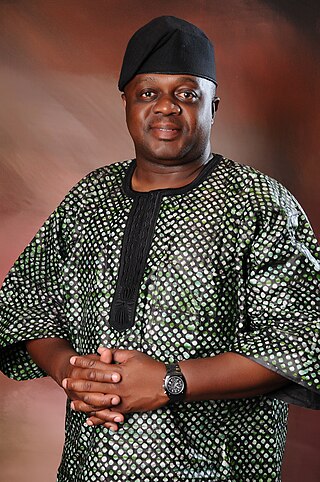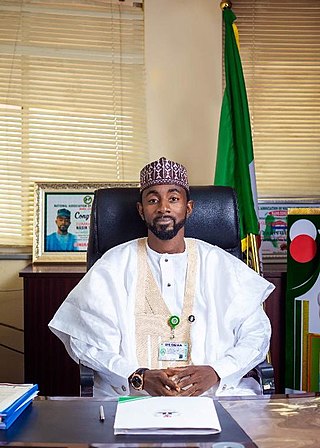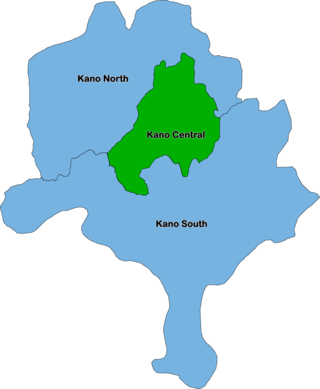The All Nigeria Peoples Party (ANPP) was a political party in Nigeria.

General elections were held in Nigeria on 21 April 2007 to elect the President and National Assembly. Governorship and State Assembly elections had been held on 14 April.

The Action Congress of Nigeria (ACN), formerly known as Action Congress (AC), was a Nigerian political party formed via the merger from the coming together of a faction of Alliance for Democracy, the Justice Party, the Advance Congress of Democrats, and several other minor political parties in September 2006. The party controlled Lagos. It was regarded as a natural successor to the progressive politics more closely associated with the Action Group and Unity Party of Nigeria (UPN) led by Chief Obafemi Awolowo in the First and Second Republics respectively. However, criticism of the party's more pragmatic and less ideological political outlook associated with AG and UPN, has made many argue it was less of a worthy political heir. The Party had strong presence in the South West, Mid-West and North Central Regions. Lagos, Edo, Ekiti, Kogi, Ondo, Bauchi, Plateau, Niger, Adamawa, Oyo and Osun states by far accounts for majority of the party's presence and discernible power base.

The Fourth Republic is the current republican government of Nigeria. Since 1999, it has governed the country according to the fourth republican constitution. Nigeria adopted the constitution of the Fourth Republic on 29 May 1999.

Lawali Shuaibu is a Nigerian politician who was elected senator for the Zamfara North Senatorial District of Zamfara State, Nigeria at the start of the Nigerian Fourth Republic, running on the All People's Party (APP) platform. He took office on 29 May 1999. He was re-elected on the All Nigeria People's Party (ANPP) platform in 2003 to a second term of four years.
Abu Ibrahim is a Nigerian politician who was elected Senator for the Katsina South (Funtua) Senatorial district in April 2003 on the All Nigeria Peoples Party (ANPP) platform, serving for one term until May 2007. He was re-elected to the same seat in April 2011.
Khalifa Ahmed Zanna was a Nigerian politician who was elected Senator for Borno Central, in Borno State, in the 9 April 2011 national elections at the age of 55. He was elected under the People's Democratic Party (Nigeria) and was re-elected 2015 but died on 16 May 2015, few days before resuming office.
Basheer Lado Garba Mohammed is a Nigerian businessman who was elected Senator for the Kano Central constituency of Kano State, Nigeria in the April 2011 national elections, running on the Peoples Democratic Party (PDP) platform.
Danladi Abdullahi Sankara is a Nigerian politician who served as the senator representing the Jigawa North-West senatorial district from 2011 to 2015 and from 2019 to 2023. He is a member of the All Progressives Congress.
Ibrahim Musa is a Nigerian lawyer who was elected Senator for the Niger North constituency of Niger State, Nigeria in the April 2011 national elections.
Yusuf Musa Nagogo is a Nigerian politician who was declared elected in the April 2011 elections for the Nasarawa North Senatorial constituency of Nasarawa State, Nigeria. He ran on the Congress for Progressive Change (CPC) platform.
Prince Tony Momoh was a Nigerian journalist and a politician who was Nigerian Minister of Information and Culture (1986–1990) during the military regime of General Ibrahim Babangida.
Buba Galadima is a Nigerian politician who was National Secretary of the Congress for Progressive Change (CPC), a party formed in the run-up to the 2011 national elections as a leading platform for former military ruler and President of Nigeria General Muhammadu Buhari. He was the Spokesperson of the People's Democratic Party.

The All Progressives Congress (APC) is one of the two major contemporary political parties in Nigeria, along with the Peoples Democratic Party (PDP). Founded on 6 February 2013 from a merger of Nigeria's three largest opposition parties, the party came to power following the victory of party candidate Muhammadu Buhari in the 2015 presidential election. This marked the first time in Nigerian history that an opposition party unseated a governing party and power was transferred peacefully.

Olanrewaju Adeyemi Tejuoso is a Nigerian medical doctor and politician who served as a senator representing Ogun Central in the 8th National Assembly from 2015 to 2019.

Nasir Adhama in Kano, Nigeria, is a Nigerian politician and youth activist who served as a Senior Special Assistant to Nigeria's President Muhammadu Buhari on Youth and Student affairs.
Ismaeel Buba Ahmed, who is popularly called Leader is a Nigerian politician, lawyer, and youth leader who has served as a Senior Special Assistant on National Social Investment Program to Nigerian Former President Muhammadu Buhari from 2018 to 2022.
Kabiru Muhammad Gwangwazo is an activist, journalist and a Nigerian politician from Kano state, Nigeria.

The 2023 Nigerian Senate elections in Kano State will be held on 25 February 2023, to elect the 3 federal Senators from Kano State, one from each of the state's three senatorial districts. The elections will coincide with the 2023 presidential election, as well as other elections to the Senate and elections to the House of Representatives; with state elections being held two weeks later. Primaries were held between 4 April and 9 June 2022.
Ibrahim Al-Amin Little is a Nigerian politician and businessman. He is a former chairman of the defunct All Nigerian Peoples Party (ANPP) in Kano State and a former gubernatorial candidate. He is also a cousin-in-law of Atiku Abubakar, the presidential candidate of the People's Democratic Party (PDP) in 2023.








